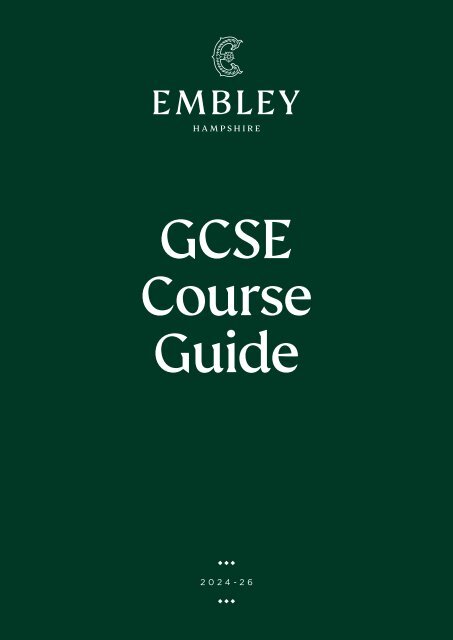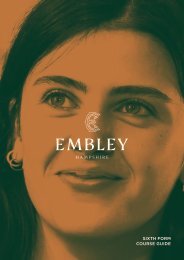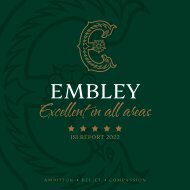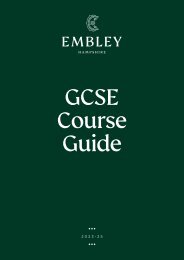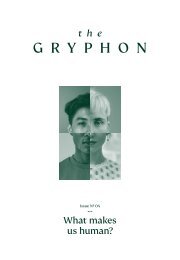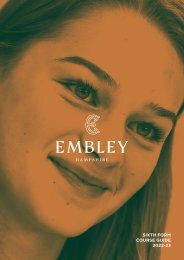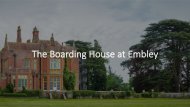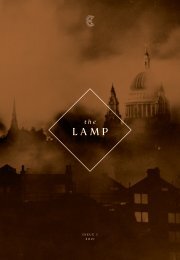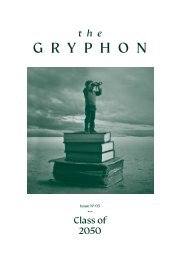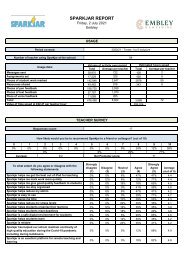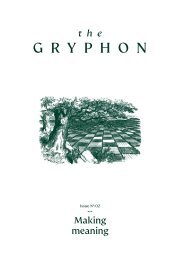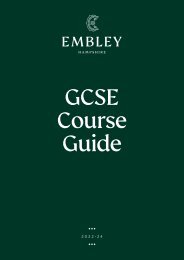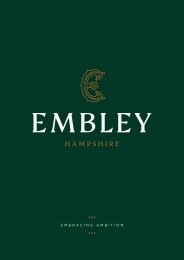Embley GCSE Guide 2024-26
You also want an ePaper? Increase the reach of your titles
YUMPU automatically turns print PDFs into web optimized ePapers that Google loves.
<strong>GCSE</strong><br />
Course<br />
<strong>Guide</strong><br />
<strong>2024</strong>-<strong>26</strong>
CONTENTS<br />
INTRODUCTION 3<br />
<strong>GCSE</strong> SUBJECTS AT EMBLEY 3<br />
CORE <strong>GCSE</strong>S: 4-5<br />
ENGLISH LANGUAGE & ENGLISH LITERATURE 4<br />
MATHEMATICS 4<br />
SEPARATE SCIENCES (THREE <strong>GCSE</strong> GRADES – OPTION SUBJECT) 5<br />
COMBINED SCIENCE (TWO <strong>GCSE</strong> GRADES) 5<br />
<strong>GCSE</strong> OPTIONS: 6-14<br />
ART, CRAFT & DESIGN 6<br />
BUSINESS STUDIES 6<br />
COMPUTER SCIENCE 7<br />
DRAMA 7<br />
FOOD PREPARATION & NUTRITION 8<br />
FRENCH 8<br />
GEOGRAPHY 9<br />
HISTORY 9<br />
MUSIC 10<br />
PHOTOGRAPHY 11<br />
PHYSICAL EDUCATION 11<br />
POLITICS 12<br />
RELIGIOUS STUDIES 12<br />
SPANISH 13<br />
THREE DIMENSIONAL DESIGN 13<br />
FREQUENTLY ASKED QUESTIONS 14
INTRODUCTION<br />
In this booklet, students and parents will find an<br />
outline of the <strong>GCSE</strong> courses offered at <strong>Embley</strong>. In<br />
addition, Heads of Department and subject teachers<br />
will talk to students during lesson time about their<br />
subjects at <strong>GCSE</strong>. They will tell students about the<br />
content, skills and coursework (if applicable) involved<br />
with each subject.<br />
It is important that students think carefully about<br />
their choices. The subjects they take at <strong>GCSE</strong> will<br />
determine their options at A Level, university and<br />
even in their future careers. They should try to<br />
identify their individual strengths and match them to<br />
the requirements of the subjects on offer.<br />
It is important for students to keep as many<br />
opportunities as possible open for the future, whilst<br />
also ensuring that the choices they make reflect their<br />
academic strengths and interests. We are all very<br />
keen for students to make the right choices so that<br />
they can get the most out of their education.<br />
The total number of <strong>GCSE</strong> qualifications taken at<br />
<strong>Embley</strong> is usually nine, with universities and colleges<br />
placing more importance on the quality of students’<br />
<strong>GCSE</strong> grades than the number of subjects taken.<br />
They are also looking for candidates who have a<br />
commitment to interests and hobbies beyond the<br />
taught curriculum.<br />
For students and parents who have any questions<br />
about <strong>GCSE</strong> choices, our staff are available to help.<br />
Please speak directly with subject teachers, form<br />
tutors and relevant Heads of Department or contact<br />
Mr Clare (Director of Studies).<br />
Staff email addresses are available on our website:<br />
www.embley.org.uk/about/staff-directory/<br />
<strong>GCSE</strong> SUBJECTS AT<br />
EMBLEY<br />
All students study five core <strong>GCSE</strong> subjects:<br />
• English Language<br />
• English Literature<br />
• Mathematics<br />
• Science: Students will choose between:<br />
Combined Science (two <strong>GCSE</strong>s)<br />
OR<br />
Separate Sciences (three <strong>GCSE</strong>s)<br />
Students wishing to study Biology, Chemistry<br />
and Physics as separate subjects should select<br />
Separate Sciences as one of their options<br />
In addition, students will normally select a further<br />
four subjects to study at <strong>GCSE</strong> from the following list:<br />
• Art, Craft & Design<br />
• Business Studies<br />
• Computer Science<br />
• Drama<br />
• Food Preparation & Nutrition<br />
• French<br />
• Geography<br />
• History<br />
• Music<br />
• Photography<br />
• Physical Education<br />
• Politics<br />
• Religious Studies<br />
• Separate Sciences (as detailed above)<br />
• Spanish<br />
• Three Dimensional Design<br />
Students are strongly advised to select either French<br />
or Spanish as one of their choices,<br />
As part of each student’s personal character<br />
development, our <strong>GCSE</strong> timetable also includes<br />
Games, Physical Education (PE) and Personal, Social,<br />
Health and Economic education (PSHE) lessons.<br />
3
CORE <strong>GCSE</strong>S<br />
ENGLISH LANGUAGE &<br />
ENGLISH LITERATURE<br />
The twin <strong>GCSE</strong> qualifications of English Language<br />
and English Literature offer <strong>Embley</strong> students the<br />
opportunity to investigate, construct and excel in a<br />
number of fascinating areas. As well as exploring the<br />
intricacies of Shakespeare, 19th Century literature<br />
and a range of poetry from across the ages, students<br />
produce writing in a number of forms, express<br />
themselves in a myriad of different ways, read widely<br />
and engage in close textual analysis.<br />
The English courses at <strong>GCSE</strong> are designed to get the<br />
very best outcomes for <strong>Embley</strong> students, in terms of<br />
their broader learning, as well as their grades in both<br />
subjects. At the end of Year 11, <strong>Embley</strong> students will<br />
emerge as more intellectually curious, culturally aware<br />
and articulate individuals, ready for a richer artistic<br />
experience in life.<br />
We teach English Language and English Literature at<br />
the same time, as the subjects are interdependent and<br />
many of the skills involved are interlinked. Everyone<br />
takes both subjects at <strong>GCSE</strong> and emerges with two<br />
distinct and valuable qualifications. We follow a strict<br />
regime of continual improvement, based on regular<br />
assessments and bench marked against students’<br />
YELLIS baseline grades, to prepare students for a<br />
closed text exam system. They cover a diverse and<br />
exciting range of texts and topics, as well as develop<br />
their presentation skills, in groups and as individuals,<br />
with <strong>Embley</strong>’s Public Speaking Competition in the<br />
Spring term as a key point in the school calendar.<br />
Assessment<br />
ENGLISH LANGUAGE<br />
Paper 1: Exploring creative reading and writing<br />
Section A - Reading: students read a fictional passage<br />
and answer questions about it<br />
Section B - Writing: students write their own piece of<br />
fiction, based on the same theme<br />
Examples: ‘Write a story set on a dark night’ or<br />
‘Write a story about a time when things turned out<br />
unexpectedly’.<br />
Paper 2: Expressing a point of view<br />
Section A - Reading: students read two passages of<br />
non-fiction and answer questions about them.<br />
Section B - Writing: students write to present a<br />
viewpoint.<br />
Example: ‘Parents today are over-protective. They<br />
should let their children take part in adventurous, even<br />
risky, activities to prepare them for later life.’ Write an<br />
article for a broadsheet newspaper in which you argue<br />
for or against this statement.<br />
Students are also assessed on their Public Speaking<br />
presentation and receive a pass, merit or distinction<br />
grade for it on their exam certificate.<br />
Examination board: AQA<br />
ENGLISH LITERATURE<br />
Paper 1: Shakespeare and the 19th Century novel<br />
Section A – Students will answer a question on a<br />
Shakespeare play, starting with detailed analysis of a<br />
passage. We will study Shakespeare’s great, dramatic<br />
and accessible tragedy, Macbeth.<br />
Section B - We will study A Christmas Carol, Dickens’<br />
iconic novella, detailing the gradual redemption of the<br />
classic 19th Century miser, Scrooge.<br />
Paper 2: Modern texts<br />
Section A - Modern texts: students will answer a<br />
question on a text they have studied. We will enjoy<br />
Golding’s iconic, futuristic novel, Lord of the Flies,<br />
designed to stimulate, enthrall, stretch and challenge<br />
our students to produce their best possible responses.<br />
Section B – Poetry: students write answers based on<br />
poems that they have studied during the course. We<br />
have chosen the Power and Conflict poems from the<br />
AQA anthology, containing great poems by Duffy,<br />
Blake, Wordsworth, Shelley, Tennyson and Heaney.<br />
Section C - Unseen poetry: students respond to two<br />
unseen poems, testing their intelligence, flexibility and<br />
creativity when responding to something they have<br />
not prepared in advance.<br />
Examination board: AQA<br />
MATHEMATICS<br />
Some of civilisation’s most prized achievements are<br />
reliant on Mathematics. Planes flying seamlessly<br />
through the air, the availability of complex medicines<br />
and computers, to name a few, rely on the use and the<br />
study of numbers. Even if you don’t aspire to work in<br />
a mathematical field, the skills taught in this subject<br />
enable you to approach any problem in life with logic<br />
and structure.<br />
The key aims of <strong>GCSE</strong> Mathematics are:<br />
• To ensure students have the numerical skills<br />
required to progress to employment<br />
• To embed problem solving rigorously in teaching,<br />
learning and assessment<br />
• To stretch and challenge all students<br />
• Appropriately prepare students thoroughly for the<br />
study of A Level Mathematics<br />
This is a three-year course that begins at the start of<br />
4
Year 9. Students are taught according to attainment.<br />
This ensures that class content is well-targeted to<br />
students who may be preparing for different <strong>GCSE</strong><br />
exam levels or advanced qualifications.<br />
Students are entered into either a Foundation, or<br />
Higher tiered examination. Top set students have the<br />
opportunity to study Mathematics beyond <strong>GCSE</strong> in<br />
the form of the AQA Further Maths <strong>GCSE</strong> in class and<br />
as co-curricular activities. This course introduces them<br />
to the power and elegance of advanced mathematics<br />
and helps prepare them for A Level study.<br />
Teaching is given by clear instruction with then<br />
opportunity for questioning, discussion and practice,<br />
which leads to problem solving and exam style<br />
questions. A large emphasis is placed on independent<br />
practice. Homework in Year 11 is given weekly, as a<br />
group of <strong>GCSE</strong> questions on topics that students have<br />
studied. Regular short assessments are given every<br />
two weeks to identify any areas of focus and enable<br />
the student, with the help of the teacher, to address<br />
any issues. Summative tests are given termly, which<br />
require students to recall all the facts and methods in<br />
the course up to that point. This constant practice of<br />
previous learning secures it in the long-term memory<br />
and makes revision before the <strong>GCSE</strong> exam less<br />
onerous.<br />
Assessment<br />
At the end of Year 11, assessment takes the form of<br />
two examination papers which may test any of the<br />
content taught. Both papers require a range of skills<br />
including: using and applying standard techniques,<br />
reasoning, interpreting and communicating<br />
mathematically and solving problems in Mathematics<br />
and in other contexts.<br />
Examination board: I<strong>GCSE</strong> Edexcel<br />
SEPARATE SCIENCES<br />
Science increasingly determines the nature of our<br />
society, culture and the environment. Life at home, at<br />
school and in the work place is constantly changing<br />
to meet the new challenges of scientific change.<br />
Everyone needs to be equipped with knowledge and<br />
understanding to take advantage of new opportunities<br />
as they arise. A good understanding of Science<br />
allows effective contribution to social, medical,<br />
environmental, industrial and ethical issues.<br />
This option gives students a greater depth of study<br />
of the topics covered in Combined Science. It is a<br />
three year course that begins in Year 9. Students are<br />
taught through the three main scientific subjects<br />
of Biology, Chemistry and Physics by specialist<br />
teachers. Following examinations in Year 11, students<br />
are awarded three Science <strong>GCSE</strong> grades in Biology,<br />
Chemistry and Physics.<br />
Topics studied are outlined here:<br />
Biology:<br />
• Cell biology<br />
• Organisation<br />
• Infection and response<br />
• Bioenergetics<br />
• Homeostasis and response<br />
• Inheritance, variation and evolution<br />
• Ecology<br />
Chemistry:<br />
• Atomic structure and the periodic table<br />
• Bonding, structure and properties of matter<br />
• Quantitative chemistry<br />
• Chemical changes<br />
• Energy changes<br />
• The rate of chemical change<br />
• Organic chemistry<br />
• Chemical analysis<br />
• Chemistry of the atmosphere<br />
• Using resources<br />
Physics:<br />
• Energy<br />
• Electricity<br />
• Particle model of matter<br />
• Atomic Structure<br />
• Forces<br />
• Waves<br />
• Magnetism and electromagnetism<br />
• Space Physics<br />
Assessment<br />
Practical work is at the heart of Science. All students<br />
carry out 28 required practicals across the three<br />
Sciences during the <strong>GCSE</strong> course. The practical<br />
skills are assessed in the written papers. These<br />
questions account for 15% of the overall marks for the<br />
qualification. There are six exam papers, two in each<br />
subject. The papers include multiple choice, short<br />
answer and open response questions.<br />
Examination board: AQA<br />
COMBINED SCIENCE<br />
<strong>GCSE</strong> Combined Science follows the same course<br />
structure as Separate Sciences. Students study the<br />
same topics as Separate Sciences, with the exception<br />
of Space Physics. All topics are covered in slightly less<br />
detail in Combined Science. Assessment also follows<br />
the same format. However, students taking <strong>GCSE</strong><br />
Combined Science carry out 21 required practicals<br />
across the three Sciences during the <strong>GCSE</strong> course.<br />
Following examinations in Year 11, students are<br />
awarded two <strong>GCSE</strong>s.<br />
Examination board: AQA<br />
5
<strong>GCSE</strong> OPTIONS<br />
ART, CRAFT & DESIGN<br />
Art, Craft & Design is an ideal <strong>GCSE</strong> for students with<br />
broad artistic skills, interests and ambitions. Art and<br />
Design is a way of seeing things and making sense of<br />
the world. The course is 100% practical and students<br />
develop knowledge, skills and understanding through<br />
hands on experimentation and exploration. Painting<br />
and drawing form the foundations of the course<br />
but students also have the option of exploring<br />
printmaking, photography, digital editing, textiles<br />
and/or 3D.<br />
By working with a variety of techniques, materials<br />
and resources, students produce a broad and diverse<br />
portfolio of practical work. They will also develop an<br />
understanding and appreciation of the work of artists,<br />
designers, craftspeople and cultures to inform and<br />
inspire their work.<br />
Art, Craft & Design develops a variety of transferrable<br />
skills including problem solving, creative thinking,<br />
investigation, research, communication and the ability<br />
to develop, refine and present ideas. Employers<br />
and universities regard these skills highly. There<br />
are a huge variety of career paths that require the<br />
knowledge and skills developed in art ranging from<br />
fashion to interior design, animation to theatre<br />
design, and the creative industries. If a student enjoys<br />
being creative, wants to increase their practical<br />
skills as well as their analytical, communication and<br />
research abilities then Art, Craft and Design is a great<br />
choice.<br />
Assessment<br />
This course comprises two coursework projects<br />
known as ‘Component 1: Portfolio’, which is worth<br />
60% of the <strong>GCSE</strong>. These projects are completed<br />
from September of Year 10 to January of Year 11.<br />
After a period of skills building in Year 10, students<br />
become increasingly independent and responsible<br />
for generating their own ideas and determining the<br />
direction of their own projects, during which time<br />
they receive individual support with the skills they<br />
wish to explore further.<br />
The final 40% of <strong>GCSE</strong> marks come from ‘Component<br />
2: Externally Set Assignment’ which is completed<br />
from January to May in Year 11. This is another<br />
practical project set by the exam board. It features<br />
seven tasks and students will have to choose which to<br />
complete within a set time period.<br />
Examination board: AQA<br />
BUSINESS STUDIES<br />
Business Studies teaches students to develop as<br />
enterprising individuals with a practical set of skills,<br />
including problem solving, decision making and<br />
interpreting and analysing data. Students acquire<br />
knowledge and develop life skills that enable them to<br />
become financially and commercially aware.<br />
Students gain a practical insight into the commercial<br />
world as the course uses a variety of real business<br />
case studies and examples to consider issues and<br />
challenges facing entrepreneurs and organisations.<br />
Students have the opportunity to work collaboratively<br />
on projects and make justified decisions using<br />
both quantitative and qualitative data. In addition,<br />
independent learning is encouraged so that students<br />
develop the ability to enquire and think critically.<br />
They develop their communication skills through<br />
debate and discussion.<br />
At the end of Year 10, students benefit from a virtual<br />
tour organised with a local factory, giving them the<br />
opportunity to see the real-world applications of<br />
business theory.<br />
Assessment<br />
Paper 1: Business Activity, Marketing and People<br />
(50% of <strong>GCSE</strong>)<br />
Business ownership - The purpose of business activity<br />
and enterprise:<br />
• The role of business enterprise and<br />
entrepreneurship<br />
• Business planning<br />
• Business ownership<br />
• Business aims and objectives<br />
• Stakeholders in business<br />
• Business growth<br />
Marketing - How firms research their markets, set<br />
prices, devise advertising campaigns, design new<br />
products and decide where to sell:<br />
• The role of marketing<br />
• Market research<br />
• Market segmentation<br />
• The marketing mix<br />
Human Resource Management - Suitable ways in<br />
which businesses might recruit, motivate and retain<br />
their staff:<br />
• The role of human resources<br />
• Organisational structures and different<br />
ways of working<br />
• Communication in business<br />
• Recruitment and selection<br />
• Motivation and retention<br />
• Training and development<br />
• Employment law<br />
6
Paper 2: Operations, Finance and Influences on<br />
Business (50% of <strong>GCSE</strong>)<br />
Operations - Business operations, their role within the<br />
production of goods and the provision of services,<br />
and the role technology can play in this process:<br />
• Production processes<br />
• Quality of goods and services<br />
• The sales process and customer service<br />
• Consumer law<br />
• Business location<br />
• Working with suppliers<br />
Finance - The importance of finance to a business:<br />
• The role of the Finance function<br />
• Sources of finance<br />
• Revenue, costs, profit and loss<br />
• Break-even<br />
• Cash and cash flow<br />
Influences on business - The importance of external<br />
influences on business:<br />
• Ethical and environmental considerations<br />
• The economic climate<br />
• Globalisation<br />
Examination board: OCR<br />
COMPUTER SCIENCE<br />
Computer Science is a practical subject, in which<br />
students apply the academic principles and skills<br />
learned in the classroom to real-world problems in an<br />
exciting and engaging way.<br />
The course puts computational thinking at its<br />
core, helping students develop the skills to solve<br />
problems, design systems and understand human<br />
and machine intelligence. These skills are the best<br />
preparation for students who want to go on to study<br />
Computer Science at A Level and can lead to jobs in<br />
web design, app and game development, analytics,<br />
software design and engineering. The qualification<br />
also provides a good grounding for other subject<br />
areas that require computational thinking and<br />
analytical skills.<br />
Assessment<br />
Component 1: Computer systems (50% of <strong>GCSE</strong>,<br />
examined unit)<br />
• Systems architecture<br />
• Memory and storage<br />
• Computer networks, connections and protocols<br />
• Network security<br />
• Systems software<br />
• Ethical, legal, cultural and environmental impacts<br />
of digital technology<br />
Component 2: Computational thinking, algorithms<br />
and programming (50% of <strong>GCSE</strong>, examined unit)<br />
• Algorithms<br />
• Programming techniques<br />
• Producing robust programs<br />
• Boolean logic<br />
• Programming languages and Integrated<br />
• Development environments<br />
Component 3: Practical programming<br />
All students are given the opportunity to undertake<br />
a programming task(s), either to a specification or to<br />
solve a problem (or problems), during the course.<br />
Examination board: OCR<br />
DRAMA<br />
Drama gives students the opportunity to get out<br />
from behind their desks, make their own creative<br />
decisions and exercise their imaginations. They<br />
develop self-confidence, presentation skills and<br />
teamwork skills. They study plays and theatre<br />
practitioners, learn about the history of theatre,<br />
see a range of live performances and develop their<br />
performance and technical theatre skills.<br />
We believe that providing our students with<br />
performance opportunities is an important<br />
aspect of developing their performance craft and<br />
understanding of drama and theatre. Students<br />
have the chance to perform in showcases and the<br />
opportunity to audition for other school events and<br />
productions throughout the year.<br />
Assessment<br />
Component 1: Devising theatre (40% of <strong>GCSE</strong>)<br />
This course starts with a knowledge and skillsbuilding<br />
unit of work in which students will explore<br />
the roles of the director, actor and designer. They<br />
then study a range of practitioners and theatrical<br />
styles and choose to apply what they have learnt<br />
about one practitioner or style to the creation of<br />
an entirely original piece of drama, in response to a<br />
stimulus issued by the exam board. To prepare for<br />
assessment, students are required to:<br />
• Develop a portfolio of supporting evidence<br />
• Prepare and perform their piece of devised<br />
theatre<br />
• Write an evaluation of the final performance.<br />
This component is completed in Year 10. Students<br />
are assessed individually by their teachers and the<br />
work is externally moderated. There is an option for<br />
students to select design instead of acting as their<br />
chosen skill for the performance.<br />
Component 2: Performing from a text (20% of <strong>GCSE</strong>)<br />
With guidance from their teacher, students select<br />
and study two extracts from a published play and<br />
present it for formal performance to an audience.<br />
They work in small groups and are assessed either as<br />
actors or as designers. A visiting examiner assesses<br />
7
the work; again, students are marked individually. This<br />
component is completed in Year 11.<br />
Component 3: Interpreting theatre (40% of <strong>GCSE</strong>)<br />
Throughout the two-year course, students prepare<br />
for both sections of this component, which is<br />
assessed in a written examination of 1 hour and 30<br />
minutes.<br />
Section A: Set Text. Students study one set text and<br />
are expected to answer questions on this play from<br />
the perspective of an actor, director and designer.<br />
The text is studied both theoretically and practically,<br />
with a strong emphasis on students developing their<br />
own staging concept and performance ideas for the<br />
play.<br />
Section B: Live Theatre Review. Students are required<br />
to analyse and evaluate aspects of a live theatre<br />
production seen during the course. A range of<br />
suitable trips are organised to support the study of<br />
this aspect of Component 3. Students are also given<br />
the opportunity to watch pre-recorded productions in<br />
lessons to practise their evaluation skills.<br />
A number of theatre trips are organised to support<br />
and inspire <strong>GCSE</strong> Drama students’ work. We also<br />
welcome visiting practitioners to school to lead<br />
specialist workshops.<br />
Examination board: WJEC<br />
FOOD PREPARATION &<br />
NUTRITION<br />
The AQA Food Preparation & Nutrition course<br />
offers students a comprehensive exploration of food<br />
science, nutrition and practical culinary skills. The<br />
course covers a diverse range of topics, providing<br />
students with a robust foundation in the fundamental<br />
principles of food preparation and nutrition.<br />
The curriculum places a significant emphasis on<br />
comprehending the chemical, physical and nutritional<br />
properties of ingredients, as well as understanding<br />
how these properties transform during cooking<br />
processes. As part of the course, students immerse<br />
themselves in the science of nutrition, investigating<br />
the functions of various nutrients, understanding<br />
dietary requirements and exploring the broader<br />
impact of food choices on health. To complement<br />
their theoretical understanding, practical cooking<br />
skills are honed. These activities serve as a bridge,<br />
allowing students to apply the knowledge gained in<br />
the classroom to real-world culinary scenarios.<br />
Knowledge and skills are integrated into five core<br />
food topics:<br />
• Nutrition and health<br />
• Science<br />
• Safety<br />
• Choice<br />
• Provenance<br />
Assessment is 50% coursework and 50% exam, all<br />
completed in Year 11.<br />
Examination board: AQA<br />
FRENCH<br />
Studying French at <strong>GCSE</strong> enables students to:<br />
Communicate when travelling around the world;<br />
• Learn more about the country where the<br />
language is spoken, its people and their context<br />
from the perspective of a culture that is not the<br />
student’s own;<br />
• Add an international dimension to <strong>GCSE</strong> subject<br />
choices, which is sought after by many future<br />
employers and higher education providers;<br />
• Learn many skills which are useful in a wide range<br />
of careers, such as the ability to communicate<br />
clearly, being confident about speaking in public<br />
and using problem solving strategies; and<br />
• Create greater opportunities to work abroad or<br />
for companies in the UK with international links.<br />
Many employers look for people who are able to<br />
speak a foreign language.<br />
Students are strongly encouraged to continue the<br />
language they have studied in Year 9 to <strong>GCSE</strong>. By<br />
the end of Year 9, students have already covered<br />
many of the topics from the <strong>GCSE</strong> specification<br />
and therefore already know a lot of the vocabulary<br />
and grammar needed at <strong>GCSE</strong> level. They build on<br />
these topics as well as move onto new ones, whilst<br />
further developing their ability to understand and<br />
communicate in French.<br />
There are three themes that are divided into different<br />
topic areas.<br />
Theme 1: People and lifestyle:<br />
• Identity and relationships with others<br />
• Healthy living and lifestyle<br />
• Education and work<br />
Theme 2: Popular culture:<br />
• Free-time activities<br />
• Customs, festivals and celebrations<br />
• Celebrity culture<br />
Theme 3: Communication and the world around us:<br />
• Travel and tourism, including places of interest<br />
• Media and technology<br />
• The environment and where people live<br />
Assessment<br />
Students are assessed in listening, speaking, reading<br />
and writing, with each skill worth 25% of the final<br />
<strong>GCSE</strong> examination. There are final examinations in all<br />
four skills taken at the end of Year 11. The speaking<br />
8
examination is conducted and recorded by each<br />
language teacher and then sent to the examination<br />
board for marking.<br />
Examination board: AQA<br />
GEOGRAPHY<br />
This course offers students the chance to study an<br />
engaging and dynamic subject which focuses on<br />
the world around them. They study how physical<br />
processes can produce diverse and dynamic<br />
landscapes that change over time, and look at how<br />
humans interact with the physical world.<br />
Geography teaches students to become critical and<br />
reflective thinkers by engaging them actively in the<br />
enquiry process and by encouraging them to pose<br />
geographical questions of their own. Combining<br />
this with the knowledge and understanding they<br />
will gain of the human-physical world and the<br />
interactions between the two aspects of geography,<br />
students have the ability to become globally and<br />
environmentally informed and thoughtful, enquiring<br />
citizens.<br />
Numerous transferable skills are developed<br />
throughout the course, including the ability<br />
to interpret from a variety of sources such as<br />
photographs, satellite images and maps. Students<br />
learn a wide range of graphical, numerical and<br />
statistical skills, which are assessed in all three<br />
written exams. In addition, students develop their<br />
communication skills through debate and discussion,<br />
learning to express their ideas logically whilst taking<br />
on board the opinions of others.<br />
Fieldwork is an essential aspect of a geographical<br />
education, bringing the subject content alive.<br />
Students visit a coastal landscape to facilitate<br />
understanding of coastal landforms, cliff collapse<br />
and coastal management. In addition, they study a<br />
contrasting landscape such as an urban environment<br />
with the knowledge and understanding gained from<br />
both pieces of fieldwork being used as part of the<br />
geographical applications paper.<br />
Finally, a residential to Iceland, ‘The Land of Fire and<br />
Ice’, is offered. This is not a compulsory element of<br />
the course but will provide students with an excellent<br />
opportunity to witness the processes of tectonics,<br />
glaciation and coasts first hand.<br />
Assessment<br />
Paper 1: Living with the physical environment (35% of<br />
<strong>GCSE</strong>)<br />
Section A - The challenge of natural hazards (tectonic<br />
hazards, weather hazards, climate change)<br />
Section B - The living world (ecosystems in the UK,<br />
tropical rainforests, cold environments)<br />
Section C - Physical landscapes in the UK (coastal<br />
landscapes in the UK, glacial landscapes in the UK<br />
Paper 2: Challenges in the human environment (35%<br />
of <strong>GCSE</strong>)<br />
Section A - Urban issues and challenges (global<br />
pattern of urban change, a case study of a major city<br />
in a low income country (LIC) or newly emerging<br />
economy (NEE), a case study of a major city in the<br />
UK, sustainable urban living)<br />
Section B - The changing economic world (global<br />
variations in economic development and quality of<br />
life, strategies for reducing the global development<br />
gap, changes in the economy of the UK)<br />
Section C - The challenge of resource management<br />
(the changing demand and provision of resources in<br />
the UK – food, water, energy; global issues relating to<br />
food resources)<br />
Paper 3: Geographical applications (30% of <strong>GCSE</strong>)<br />
Section A - Issue evaluation: Assessment consists<br />
of a series of questions related to a contemporary<br />
geography issue(s) leading to a more extended piece<br />
of writing which involves an evaluative judgement. A<br />
resource booklet is available before the exam so that<br />
students can become familiar with the material.<br />
Section B – Fieldwork: Students undertake two<br />
geographical enquiries, each of which must<br />
include the use of primary data, collected as part<br />
of a fieldwork exercise. The two enquiries must<br />
take place in contrasting environments and show<br />
an understanding of both physical and human<br />
geography.<br />
Examination board: AQA<br />
HISTORY<br />
Students develop a broad knowledge and<br />
understanding of the past which helps them explain<br />
the world in which we live today.<br />
Students who have opted for <strong>GCSE</strong> History in the<br />
past have found that they have experienced a very<br />
interesting, informative, thought-provoking and<br />
enjoyable two-year course. Furthermore, they have<br />
developed a broad range of skills, such as critical and<br />
analytical thinking skills and the ability to construct<br />
supported arguments. These transferable skills are<br />
invaluable in many different situations and for many<br />
careers. This qualification enables students to:<br />
• Develop and extend their knowledge and<br />
understanding of specified key events, periods<br />
and societies in history, and of the wide diversity<br />
of human experience;<br />
• Engage in historical enquiry to develop as<br />
independent learners and as critical and reflective<br />
thinkers;<br />
9
• Develop the ability to ask relevant questions<br />
about the past, to investigate issues critically and<br />
to make valid historical claims by using a range of<br />
sources in their historical context;<br />
• Develop an awareness that different people,<br />
events and developments have been accorded<br />
historical significance and how and why different<br />
interpretations have been constructed about<br />
them; and<br />
• Organise and communicate their historical<br />
knowledge and understanding in different ways<br />
and reach substantiated conclusions.<br />
Students learn through historical enquiry. They are<br />
set questions to investigate and are required to ask<br />
and answer their own questions about the past.<br />
This enquiry-based approach requires the ability to<br />
conduct comprehensive research and use evidence<br />
critically in order to draw conclusions. Students are<br />
expected to read widely and learn how to write in<br />
a historical style. Learning is supported by a broad<br />
range of resources and source materials. Regular<br />
classroom discussions are used to allow students<br />
to engage in historical debate and form their own<br />
reasoned judgements.<br />
The course covers the following four key aspects:<br />
Depth study - Germany: Development of dictatorship<br />
(1918–45):<br />
• The establishment of the Weimar Republic and<br />
its early problems<br />
• The recovery of Germany (1924–29)<br />
• The rise of Hitler and the Nazis to January 1933<br />
• Nazi Germany (1933–39)<br />
• Germany and the occupied territories during<br />
the Second World War<br />
Depth study - A divided union: Civil Rights in the USA<br />
(1945–74):<br />
• The Red Scare and McCarthyism<br />
• Civil rights in the 1950s<br />
• The impact of civil rights protests (1960–74)<br />
• Other protest movements: students, women,<br />
anti–Vietnam<br />
• Nixon and Watergate<br />
Investigation Study - The origins and course of the<br />
First World War (1905–18):<br />
• The alliance system and international rivalry<br />
(1905–14)<br />
• The growth of tension in Europe (1905–14)<br />
• The Schlieffen Plan and deadlock on the<br />
Western Front<br />
• The war at sea and Gallipoli<br />
• The defeat of Germany<br />
Breadth study - Changes in medicine (c1848-c1948):<br />
• Changes in medical treatment and in<br />
understanding the cause of illness<br />
• Improvements in public health provision<br />
• Changes in surgery<br />
• The changing role of women in medicine<br />
• The impact of war and science and technology<br />
on medicine<br />
Assessment<br />
The course is assessed in two exams, both taken at<br />
the end of Year 11.<br />
Examination board: Edexcel International <strong>GCSE</strong><br />
(I<strong>GCSE</strong>)<br />
MUSIC<br />
This course focusses on making and listening to<br />
music and covers performing, composing and<br />
appraising in a wide variety of musical styles:<br />
instrumental music 1700-1820, vocal music, music<br />
for stage and screen, and fusion music. Students<br />
interested in music technology may use computer<br />
sequencers, multi-track recorders, digital recording<br />
and sampling in the preparation and presentation of<br />
compositions.<br />
This course is essential preparation for further musical<br />
study and a solid foundation for A Levels in Music<br />
and Music Technology. Students may wish to take<br />
<strong>GCSE</strong> Music for its own sake, perhaps to form the<br />
basis of a future interest. Alternatively, they may wish<br />
to go into a profession in which it is useful to have<br />
had experience of music or in which it is beneficial to<br />
use some of the skills developed during this course.<br />
These might include careers in the music industry,<br />
publishing, entertainment and teaching or any job<br />
that involves communication and expressive skills.<br />
Assessment<br />
Listening (40% of <strong>GCSE</strong>):<br />
This is based on four areas of study:<br />
• Instrumental music (1700–1820)<br />
• Vocal music<br />
• Music for stage and screen<br />
• Fusions<br />
In each of these areas, students study two set works<br />
in terms of analysis and historical/social background.<br />
They are expected to have developed some aural<br />
skills, as well as a thorough knowledge of the eight<br />
set works.<br />
Composition (30% of <strong>GCSE</strong>):<br />
This is completed as coursework. Initially in Year<br />
10, students compose many short practice tasks,<br />
learning to apply the knowledge they have gained<br />
from the set works. In Year 11, they begin work on<br />
two compositions they hand in under controlled<br />
conditions. One of these compositions needs to draw<br />
its stimulus from a board set brief and the other is<br />
a free composition. The composition tasks can be<br />
1 0
created using music technology or practically on<br />
students own instrument.<br />
Performance (30% of <strong>GCSE</strong>):<br />
It is assumed that students have instrumental/<br />
vocal lessons to help prepare for the final recorded<br />
performance; in class lessons there are occasional<br />
workshops and practice performances. Students<br />
prepare one solo and one ensemble performance;<br />
their best recorded performances will be submitted.<br />
Students are assessed in a variety of ways throughout<br />
the course. They are asked to perform regularly at<br />
school and external events. Homework consists of<br />
a mixture of written work, based on knowledge of<br />
the set works and also music theory activities and<br />
composition tasks.<br />
Examination board: Edexcel<br />
PHOTOGRAPHY<br />
Photography is an ideal course for students with<br />
an interest in media and digital technology. Digital<br />
photography is used extensively in the creative<br />
industries and media, and there are a wealth of career<br />
paths that involve the skills acquired during this<br />
course.<br />
Students have the opportunity to explore location<br />
photography, studio photography, experimental<br />
imagery, documentary photography, moving image<br />
and fashion photography. The course is based<br />
around a series of broadly themed projects, such as<br />
viewpoints and identity. The interpretation of these<br />
themes is intentionally broad to enable the direction<br />
of the project to be tailored around a student’s<br />
individual interests and ambitions. Throughout the<br />
course students develop an understanding and<br />
appreciation the work of artists, designers and<br />
cultures to inform and inspire their work.<br />
After a term of skill-building in Year 10, including<br />
an introduction to ISO, aperture, depth of field,<br />
composition, lighting, photoshop and digital editing,<br />
students become increasingly independent and<br />
responsible for the direction of their projects,<br />
receiving individual support with the skills they wish<br />
to explore further. Access to a DSLR camera at home<br />
is recommended as students work using manual<br />
camera settings rather than automatic.<br />
Assessment<br />
The course is practical with 60% of the grades being<br />
awarded from ‘Component 1: Portfolio’ and 40% from<br />
‘Component 2: Externally set assignment’.<br />
Examination board: AQA<br />
PHYSICAL EDUCATION<br />
Physical Education will appeal to those who have a<br />
keen interest in sport and recreation and who want<br />
to follow a course that develops their knowledge and<br />
understanding of sport through classroom lessons<br />
and practical involvement. Students learn to develop<br />
knowledge and practical skills in a range of physical<br />
activities, examine the effects of exercise and see<br />
how training can improve performance. They also<br />
gain an understanding of the importance of a healthy<br />
and active lifestyle and the benefits of promoting<br />
sport for all.<br />
In studying this subject, students can expect<br />
interactive lessons in the classroom that will further<br />
their understanding of sports and performance on<br />
the field. Students find themselves using mobile<br />
applications to explore the human body, creating<br />
virtual reality skeletons within the classroom so<br />
that they can explore the different muscles, cut<br />
into a computerised heart and travel through<br />
the respiratory system. They receive first-hand<br />
experience of how a performer learns skills and how<br />
coaches can respond in order to get the most from<br />
their players.<br />
Assessment<br />
Component 1: The human body and movement in<br />
physical activity and sport (30% of <strong>GCSE</strong>, examined<br />
unit):<br />
• Applied anatomy and physiology<br />
• Movement analysis<br />
• Physical training<br />
• Use of data<br />
Component 2: Socio-cultural influences and<br />
wellbeing in physical activity and sport (30% of<br />
<strong>GCSE</strong>, examined unit):<br />
• Sports psychology<br />
• Socio-cultural influences<br />
• Health, fitness and well-being<br />
• Use of data<br />
Component 3.1: Practical performance (30% of<br />
<strong>GCSE</strong>):<br />
Students are assessed in three practical sports,<br />
chosen by the student from a list supplied by AQA.<br />
It is important to note that students are not able to<br />
perform in the same sport twice for both individual<br />
and team games, for example, badminton singles<br />
and doubles. It is generally expected that students<br />
perform competitively at school or club level in all<br />
three chosen sports.<br />
Component 3.2: Personal exercise programme (10%<br />
of <strong>GCSE</strong>):<br />
Students produce a personal exercise programme<br />
and analyse and evaluate their performance. This is a<br />
1 1
written piece of coursework that is completed in the<br />
first term of Year 11.<br />
Examination board: AQA<br />
POLITICS<br />
This exciting course enables students to understand<br />
the political institutions and ideas of the UK, leading<br />
to a <strong>GCSE</strong> in Citizenship Studies. The course<br />
supports students to critically explore how power<br />
is distributed, the foundations of democracy, the<br />
rule of law and the nature of tolerance and diversity<br />
in the UK. It is an academically challenging course<br />
that inspires students to engage with the historical<br />
and contemporary themes that run through British<br />
political life.<br />
It will equip students with the political literacy and<br />
analytical skills to engage in debating the issues<br />
behind the headlines. Lessons are taught through a<br />
stimulating mix of investigation, debate, analysis of<br />
documents, articles and films and they are supported<br />
by a rich range of textbooks and digital resources.<br />
The course is divided into five core themes.<br />
Theme A: Living together in the UK<br />
How have communities developed in the UK? What is<br />
identity? What are democratic values and where do<br />
they come from? How does local democracy work?<br />
Theme B: Democracy at work in the UK<br />
Who runs the country? How does Parliament work?<br />
How is power shared between Westminster and the<br />
devolved administrations? How does government<br />
manage public money?<br />
Theme C: Law and justice<br />
What is the law for and how does it affect us? How<br />
does the justice system work? Is crime increasing in<br />
society?<br />
Theme D: Power and influence<br />
What power and influence can citizens have? What<br />
role and influence should the media have? Does the<br />
UK have power and influence in the wider world?<br />
Theme E: Taking citizenship action<br />
An important dimension of this course is that<br />
students must carry out an in-depth, critical<br />
investigation leading to citizenship action. The<br />
investigation and action should be designed to have<br />
an impact locally, nationally or globally. Their learning<br />
from this is assessed within the examination.<br />
Assessment<br />
Assessment is taken in two written exams at the end<br />
of Year 11, each comprising 50% of the total grade.<br />
Examination board: Edexcel<br />
RELIGIOUS STUDIES<br />
Students are encouraged to develop and understand<br />
their personal values and beliefs, with an emphasis<br />
on critical analysis and the ability to construct<br />
balanced and informed arguments within the context<br />
of religious, philosophical and ethical awareness. In<br />
particular, students will:<br />
• Develop knowledge and understanding of<br />
religious beliefs, teachings and sources of<br />
wisdom and authority;<br />
• Develop the ability to construct well-argued,<br />
well-informed, balanced and structured written<br />
arguments;<br />
• Engage with questions of belief, value, meaning,<br />
purpose, truth and their influence on human life;<br />
• Reflect on and develop their own values, beliefs<br />
and attitudes in light of what they have learned<br />
and contribute to their preparation for adult life<br />
in a pluralistic society and global community;<br />
• Demonstrate knowledge and understanding of<br />
two religions; and<br />
• Understand the influence of religion on<br />
individuals, communities and societies, and<br />
understand significant common and divergent<br />
views within religions and beliefs.<br />
Beliefs, teachings and practices - students study key<br />
concepts within Christianity and one other religious<br />
view (Islam, Judaism or Buddhism, depending<br />
upon the interests of the <strong>GCSE</strong> group), to develop<br />
knowledge and understanding of the basis of<br />
teachings, beliefs and practices. As part of the study,<br />
they recognise and consider the existence and<br />
importance of common and divergent views.<br />
They learn about the sources of authority and<br />
wisdom that underpin and connect teachings,<br />
belief and practices and are able to refer to them in<br />
responses. Students will also have the opportunity to<br />
develop skills to explain, analyse and evaluate topics,<br />
in order to be able to offer reasoned and supported<br />
arguments in discussions about key issues.<br />
Four of the following six themes will be studied,<br />
dependent upon the students’ interest:<br />
Component A: Religious teachings about the<br />
nature and purpose of families in the 21st Century<br />
(sex, marriage, cohabitation and divorce) - Issues<br />
related to the nature and purpose of families, roles<br />
of men and women, equality, gender prejudice and<br />
discrimination.<br />
Component B: Religion and life - The origins and<br />
value of the universe, use and abuse of animals<br />
and the environment, sanctity of life and quality<br />
of life, abortion and ethical arguments relating to<br />
euthanasia, death and the afterlife.<br />
Component C: The existence of God and revelation<br />
1 2
- Gods and ultimate reality and ways in which God,<br />
Gods or ultimate reality might be understood through<br />
revelation, visions, miracles or enlightenment.<br />
Component D: Religion, peace and conflict - Violence,<br />
war, pacifism, terrorism, just war theory, holy war; the<br />
role of religion and belief in 21st Century conflict and<br />
peace making; the concepts of justice, forgiveness<br />
and reconciliation.<br />
Component E: Religion, crime and punishment -<br />
Religious views, crime and the causes of crime and<br />
punishment, including reasons for crime, the law and<br />
opposition to unjust law, aims of punishment and<br />
treatment of criminals, forgiveness, the death penalty<br />
and ethical arguments relating to the principle of<br />
utility and sanctity of life.<br />
Component F: Religion, human rights and social<br />
justice - human rights and social justice including<br />
prejudice and discrimination regarding women,<br />
homosexuals, freedom of religion and expression,<br />
racial discrimination and justice, wealth, poverty and<br />
exploitation of the law, people trafficking and religion<br />
and a responsibility for charity.<br />
This course aims to develop students’ analytical<br />
skills and to provide a grounding in ethical and<br />
philosophical argument, both as a basis for further<br />
study in the subject to A Level and as a valuable<br />
qualification and support for further study in other<br />
Humanities subjects and the Sciences.<br />
Assessment<br />
Students are assessed in two examinations (1 hour 45<br />
minutes each) which are taken at the end of Year 11.<br />
Examination board: AQA<br />
SPANISH<br />
Studying Spanish at <strong>GCSE</strong> enables students to:<br />
• Communicate when travelling around the world,<br />
• Learn more about the country where the<br />
language is spoken, its people and their context<br />
from the perspective of a culture that is not the<br />
student’s own;<br />
• Add an international dimension to <strong>GCSE</strong> subject<br />
choices, which is sought after by many future<br />
employers and higher education providers;<br />
• Learn many skills which are useful in a wide range<br />
of careers, such as the ability to communicate<br />
clearly, being confident about speaking in public<br />
and using problem solving strategies; and<br />
• Create greater opportunities to work abroad or<br />
for companies in the UK with international links.<br />
Many employers look for people who are able to<br />
speak a foreign language.<br />
Students are strongly encouraged to continue the<br />
language they have studied in Year 9 to <strong>GCSE</strong>. By<br />
the end of Year 9, students have already covered<br />
many of the topics from the <strong>GCSE</strong> specification<br />
and therefore already know a lot of the vocabulary<br />
and grammar needed at <strong>GCSE</strong> level. They build on<br />
these topics as well as move onto new ones, whilst<br />
further developing their ability to understand and<br />
communicate in Spanish.<br />
There are three themes that are divided into different<br />
topic areas.<br />
Theme 1: People and lifestyle:<br />
• Identity and relationships with others<br />
• Healthy living and lifestyle<br />
• Education and work<br />
Theme 2: Popular culture:<br />
• Free-time activities<br />
• Customs, festivals and celebrations<br />
• Celebrity culture<br />
Theme 3: Communication and the world around us:<br />
• Travel and tourism, including places of interest<br />
• Media and technology<br />
• The environment and where people live<br />
Assessment<br />
Students are assessed in listening, speaking, reading<br />
and writing, with each skill worth 25% of the final<br />
<strong>GCSE</strong> examination. There are final examinations in all<br />
four skills taken at the end of Year 11. The speaking<br />
examination is conducted and recorded by each<br />
language teacher and then sent to the examination<br />
board for marking.<br />
Examination board: AQA<br />
THREE DIMENSIONAL<br />
DESIGN<br />
This course is for students with aspirations to<br />
become an architect, engineer or designer. 3D Design<br />
combines all the elements of Art and Design with<br />
exciting and tangible results. It is 100% coursework<br />
with no written exam, however students are required<br />
to evaluate and reflect on their work throughout the<br />
course.<br />
After a term of initial skill-building in Year 10, students<br />
continue to develop the formal elements of design<br />
(shape, line, texture, tone, colour and form) and<br />
combine this with the introduction of more complex<br />
workshop processes.<br />
Assessment<br />
Students begin their final project for Component 1<br />
(60% of the final grade) by exploring the needs and<br />
wants of those around them. They investigate existing<br />
products and the work of other designers both local<br />
and well known. Once they have determined their<br />
1 3
own individual pathway, students explore different<br />
ideas through multimedia prototyping including<br />
both digital and physical modelling. By including<br />
STEM aspects within their projects, students can<br />
design and develop ideas that are both functional<br />
and environmentally sustainable. After they have<br />
developed their ideas using a range of different<br />
techniques, students are free to manufacture their<br />
design using all the tools and equipment available<br />
within the workshop. Throughout their portfolio,<br />
students evaluate their work and progress which<br />
allows them to explain and justify decisions through<br />
thoughtful insight and reflection.<br />
Component 2 (40% of the final grade) is an externally<br />
set assignment. The preparation period follows<br />
a similar structure to Component 1, however this<br />
culminates in a final assessed 10 hour practical<br />
examination where students show an outcome from<br />
the work that they have prepared.<br />
This course is recognised as the first steps to a career<br />
in the design, creative and engineering industries.<br />
Examination board: AQA<br />
FREQUENTLY ASKED<br />
QUESTIONS<br />
Why do I need to choose my <strong>GCSE</strong> options now?<br />
It may seem to be quite early to be thinking about<br />
which subjects students would like to study next<br />
September. However, a lot of planning needs to<br />
take place so that we can build a timetable to<br />
accommodate the range of choices students make.<br />
combination of subjects they wish to study is not<br />
possible or that one or more of their subject choices<br />
is already full. This would obviously be disappointing,<br />
so it is in their best interests to think very carefully<br />
and consult as many people as possible now, so that<br />
they are as confident as they can be when they fill<br />
in the form, that those are the best choices for them<br />
and their future.<br />
How will I be graded at the end of the <strong>GCSE</strong><br />
courses?<br />
All reformed <strong>GCSE</strong> subjects will be graded on a scale<br />
of 9-1 (9 being the highest). This replaces the A*- G<br />
grading system.<br />
What should I do if I need help choosing?<br />
We hope that this booklet, together with the time<br />
that subject teachers and form tutors spend with<br />
students discussing their options, will enable them<br />
to make informed, intelligent choices. However, if<br />
students need further help, then they should make<br />
sure that they ask the relevant staff. These are likely<br />
to be subject teachers, form tutors, relevant Heads of<br />
Department and Mr Clare (Director of Studies).<br />
I want to keep my university and career options as<br />
open as possible. What should I choose?<br />
It’s almost impossible to avoid closing some doors at<br />
this stage (students cannot, for example, pick up a<br />
language for A Level study if they haven’t chosen to<br />
continue with it at <strong>GCSE</strong>). The core subjects followed<br />
by all students at <strong>Embley</strong> should, however, help to<br />
maintain a satisfactory breadth for many possibilities<br />
in the future.<br />
What happens after I’ve submitted my <strong>GCSE</strong><br />
options?<br />
Your choices will be cross-referenced with your<br />
attainment and our teachers’ knowledge of you. If<br />
we believe your choices are not in your best interest,<br />
your tutor will offer guidance. On the rare occasion<br />
that it is not possible to accommodate certain option<br />
combinations, Mr Clare (Director of Studies) will have<br />
a conversation with you to identify a solution.<br />
We will write to all parents at Easter to confirm your<br />
choices.<br />
Can I change my mind about my option choices<br />
later?<br />
Yes, students can change their options after the<br />
submission of their option choices. However, once<br />
they have made their initial choices in February,<br />
we will take those choices, devise the option<br />
blocks and build the timetable around them. If a<br />
student subsequently decides to change their mind<br />
about their options, they may find either that the<br />
1 4
<strong>Embley</strong>, <strong>Embley</strong> Park, Romsey, Hampshire<br />
s e n i o r s c h o o l SO51 6ZE p r e p s c h o o l SO51 6ZA<br />
t e l +44 (0)1794 512206<br />
www.embley.org.uk


